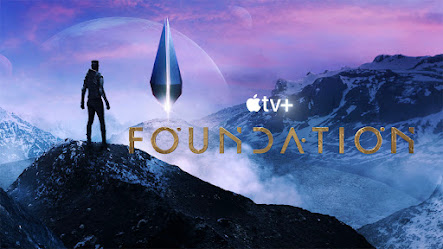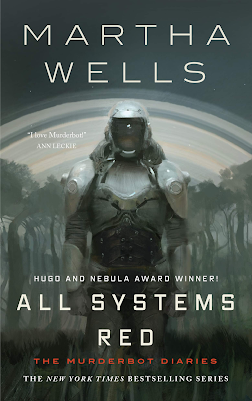More than twenty thousand years in the future, known space has been united under the rule of the Galactic Empire. The Empire has provided stability and peace for twelve millennia, the last four centuries of which have been under the rule of the Genetic Triumvirate of the Cleon Dynasty. The three emperors are enraged when respected mathematician Hari Seldon announces the discovery of psychohistory, a mathematical and statistical modelling which allows the prediction of future events. Seldon predicts nothing less than the collapse of the Empire, plunging humanity into a period of barbarism he expects to last thirty thousand years.

However, Seldon also offers a slither of hope: by creating a repository of knowledge and data, a Foundation for future reconstruction, the period of barbarism may be reduced to a single millennia. The three emperors, disturbed when Seldon's model successfully predicts a devastating terror attack on the capital world of Trantor, allow Seldon and his followers to settle on the remote world of Terminus to build the Foundation. Decades later, Seldon's followers are living a tough life on a brutal and unforgiving world when they find themselves drawn into a conflict with the neighbouring power of Anacreon, which desires nothing less than the annihilation of the Empire...and they want the Foundation's help, willingly or unwillingly, to achieve it.
Isaac Asimov's Foundation saga was, for many years, regarded as one of the untouchable taproot texts of 20th Century science fiction. Originally published as eight short stories and novellas in the 1940s, Asimov combined them with a new story in the early 1950s as three collected "fixup" novels, the infamous Foundation Trilogy. Its tale of plucky scientists and cunning engineers outwitting warlords and generals struck a chord, winning the trilogy a special Hugo Award for Best Series in 1964 (defeating J.R.R. Tolkien's Lord of the Rings along the way). After resisting the notion for many years, Asimov was convinced to return to the universe in the 1980s, penning two further sequel novels. After getting hopelessly stuck after introducing a new idea from way off left-field in those books, he went back to write two prequel novels, the last of which was published just before his death in 1992. These later sequels and prequels did not add much to the appeal of the series, being more concerned with dragging most of Asimov's work into a single "future history" of humanity than in telling a good story.
The first problem facing anyone who wants to adapt the Foundation series is therefore Asimov's own lack of coherence and consistency with the original work. Asimov only ever covered the first half of the Foundation's existence, leaving the chronologically-final novel, Foundation and Earth, with a lot of unresolved story arcs. Asimov's novels are also primarily concerned about people sitting in rooms talking, or sometimes standing in rooms talking, or sometimes sitting on a spaceship talking. Action is brief, occasional and underwhelming, with major and epic events alluded to off-page. Asimov's cast is also predominantly male with female characters playing only minor roles until the last couple of books (and even then not doing very much, at least with their clothes on). Combined with the stories in the opening trilogy being largely disconnected from one another, with many decades falling between each one, with no continuing characters beyond Seldon's holographic image, it makes turning them into a TV show problematic.
David Goyer's attempt to tackle the problem starts promisingly, focusing on the minor side-character of Gaal Dornick who is promoted here into a leading player. Played with grace and skill by newcomer Lou Llobell, Dornick is a psychohistory sceptic and mathematical genius whom Seldon - a headlining turn by actor-of-the-moment Jared Harris - recruits to help keep his project alive when the Empire tries to tear it down. The first episode, which is the most faithful to the books whilst also featuring massive changes, sets up an intriguing universe and story with a lot of promise and some absolutely brain-melting visual imagery. The spacecraft and hardware (mostly rendered through models rather than CG) feel like a vintage 1980s SF cover come to life, whilst the collapse of the Starbridge is one of the most impressive vfx set pieces put on television. It also helps that our antagonist for the episode is Emperor Cleon, or rather the three clones of the Emperor Cleon, with Brother Day (Lee Pace) and Brother Dusk (Terrence Mann) debating executing Seldon or indulging him.
Despite the major changes to the source material, the episode works in setting up the universe and retaining viewer interest. However, things quickly become divisive after this point. The storyline abruptly jumps forward fifty years to Terminus, where Warden Salvor Hardin (Leah Harvey) takes over as the main character. Terminus is barely-habitable rock, superbly realised through atmospheric location filming in volcanic regions of the Canary Islands. However, the story of events on Terminus is thin, and when the Anacreons show up to snarl about honour and vengeance like budget Klingons, you can feel you're watching a less-successful mid-season filler episode of Star Trek from around 1994. Harvey does her best, but saddled with some ripe lines and a poor American accent, it makes her a decidedly less interesting protagonist. Dornick does show up again in a self-contained side-plot, but doesn't really have a lot to do. The Foundation storyline ends up being the weakest element in a TV show called Foundation, which is a bit of a problem.
Fortunately, a wholly-new story has been invented which takes us into the Genetic Dynasty, with Brothers Dusk, Day and the young Dawn (Cassian Bilton) trying to rule over an empire from which they are almost completely separated by class, security and location. This storyline, which also features excellent performances by Laura Birn as the Emperor's right-hand robot, Eto Demerzel and Amy Tyger as a gardener, Azura Odili, is quite interesting and asks big-picture SF questions about cloning, consciousness, power and ethics. Despite being invented out of wholecloth, it's frequently intriguing and becomes moreso when Brother Day departs for the moon known as the Maiden to win the support of the Luminist faith for his policies. On Maiden, the Emperor has to face unique personal challenges and a formidable political opponent, Zephyr Halima (an excellent performance by T'Nia Miller).
This storyline works because it hinges on Lee Pace's superb performance (albeit one that falls squarely within the centre of his range). Pace has become a reliable performer for intense, charismatic roles requiring a degree of intelligence (see also his Thranduil in the Hobbit trilogy, Joe MacMillan in Halt and Catch Fire and Ronan the Accuser in Guardians of the Galaxy and Captain Marvel). Pace quickly becomes the show's most vital player, given that Jared Harris's heavily-trailed role in the series was somewhat...overstated: Hari Seldon is a low-key presence, and doesn't appear in many episodes.
If the Genetic Dynasty and the internal politics of the Empire were the main draw of Foundation, the show would have ended up being pretty solid. However, Foundation goes off-track whenever it tries to actually tackle the storyline involving the Foundation, at which point it veers from its semi-successful goal of being "Game of Thrones in space" to being a very generic action story without many compelling characters. This leaves the show feeling unbalanced, verging on the schizophrenic. Gaal Dornick's story is also potentially intriguing, but far too static, with the story going out of its way to prevent the character from interacting with the other plotlines until the very end but not giving her much to do in the meantime that's worthwhile.
Foundation's first season (***) is very strangely structured and paced. The storylines involving Trantor, the Emperors, the Starbridge and the Maiden are all very solid, verging on the good, but everything on Terminus involving the Anacreons and the Foundations is tedious. The cast is mostly solid, with Lee Pace, Terrance Mann and Jared Harris (in his fleeting appearances) excelling and Lou Llobell giving a great performance, but some of them are much better-served by the material than others. A second season has been commissioned, and will reportedly adapt the much more dynamic storyline from Foundation and Empire about Imperial General Bel Riose militarily confronting the Foundation, which could make for a much stronger narrative. But in its first season, Foundation squanders a lot of its Trantor-set promise on a badly-thought out, generic action story that goes nowhere. The show needs much more consistency if it's to become must-see TV. Right now, it's more "meh, check it out if you're not doing anything else or need some really awesome new desktop backgrounds."
Foundation is available to watch on Apple TV+ worldwide.





